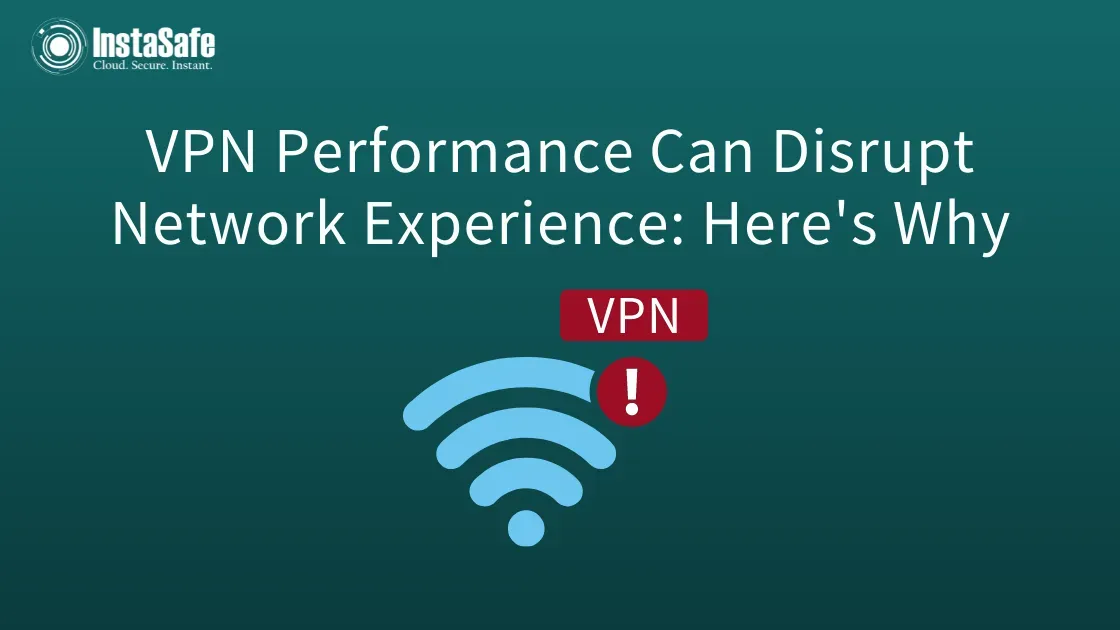VPN Performance Can Disrupt Network Experience: Here's Why

Optimum network connectivity and uninterrupted performance are highly important to boost users' network experience and improve productivity.
Regarding Virtual Private Networks (VPNs), employee complaints about network latency and performance degradation are frequent across organisations of all shapes and sizes. Poor network VPN performance hampers productivity significantly because of disrupted services, like delays in accessing network resources and constant disconnections while streaming video calls.
But what causes such a performance disruption in VPNs, and what's the solution? In this article, we'll learn more about VPNs, what makes them degrade your network performance, and how you can improve it with Zero Trust Security. So let's get right into it.
VPNs And Why Do They Degrade Network Performance?
Virtual Private Networks (VPNs) create private networks or tunnels that connect your remote working employees or third-party entities, like contractors, to your company's network applications and resources. It allows your employees or users to access these resources from a public internet connection while giving them anonymity and online privacy.
While VPNs were a popular network connectivity solution in the past, it proves to be bulky, less secure, and slow for today's increasing cybersecurity threats, growth in traffic, and increasing demands for remote access.
Here are some of the security risks that come with the traditional VPN security solution, making them hamper performance and not meet your modern workplace needs efficiently:
- Excessive implicit trust: VPNs assume every entity or user accessing the network is safe. Resulting in excessive implicit trust for all users and devices. It doesn't authenticate the users like modern solutions like the Zero Trust model.
Hence, it allows malicious users and entities to exploit the network and easily access resources for malicious purposes. This trust not only puts the network resources at risk but also increases traffic—resulting in performance lags and degradation.
- Backhauling: Since VPNs allow access to anyone and everyone—it leads to backhauling of the user data traffic, resulting in impeded network connectivity and latency issues.
- Increased attack surface: VPNs expose employees' IP addresses to external network traffic. This is because it doesn't verify the users and allows access to everyone—increasing the attack surface. This makes it effortless for malicious users to access resources, exploiting network security and hampering its performance.
- Management complexity: With the increasing network traffic, VPNs become difficult to scale and manage the complexity of adding more users to the network. This is because VPNs require heavy operational expenditure for maintenance and scalability. Thus, as the traffic increases, the network performance gets slower and slower with VPNs.
So, what's the VPN alternative? The answer is the Zero Trust VPN solution.
How Can Zero Trust Replace VPNs And Ensure Reliable Network Performance?
Zero Trust is a network security solution that works on the principle of ''Never Trust, Always Verify,'' a secure and excellent remote access solution for organisations all across the globe.
In VPN-Zero Trust security comparison, the latter ensures maximum security, performance, and network stability—despite heavy traffic.
Here's how Zero Trust ensures maximum network performance for your organisation's network.
- Security and authentication: Unlike VPNs, Zero Trust allows all users and devices to access network resources and applications through strict authentication and authorisation processes. It considers everyone unsafe and only grants entry to authenticated and verified users and devices to the network.
It also helps prevent lateral movement within the network, making it easier to extend the cloud assets and remote employees with confidence and utmost security and performance.
- Least privilege access: Zero Trust doesn't grant authenticated users access to the entire network with every resource. Instead, it lets you leverage the least privileged access, allowing you to offer resource access on a need-to-know basis.
Thus, users or employees can only access the resources required to do their work. This also helps prevent multiple users from accessing the same resources, preventing degradation issues.
- Simplicity and scalability: The Zero Trust Network VPN solution removes the redundant security stacks with VPNs that come with management complexity.
Zero Trust ensures seamless scalability and performance with a simple single unified, secure access solution for remote users and employees.
- Seamless user experience: This secure and simple single-click access solution not only improve performance but also boost user experience and employee productivity with no backhauling or latency issues like with VPNs.
- Granular access controls: With the Zero Trust Security model, you also get granular access control, making it easier to grant access and monitor network activity and performance.
Conclusion
Suppose VPNs are disrupting your network performance and making it work slow, hampering user productivity and efficiency; it's time to replace your remote access solution with a reliable and robust service. In addition, VPNs don't meet the needs of modern organisations, such as secure remote access and seamless scalability.
On the contrary, the Zero Trust Security solution ensures robust security and seamless scalability, eliminates latency, and delivers excellent performance—boosting employee experience and enhancing overall productivity. So, suppose you need help choosing the right VPN alternative for your organisation. In that case, you can check our InstaSafe Zero Trust solutions or get in touch with us to learn more about enhancing network performance with Zero Trust. Contact us today!
Key Products
Zero Trust Application Access | Zero Trust Network Access | Multi Factor Authentication | IAM Identity And Access Management | Secure Enterprise Browser
Key Features
SSO Single Sign On | Endpoint Security | Contextual Based Access Controls | Always On VPN Connection |Clientless VPN | Device Binding | Device Posture Check | Domain Joining
Key Solutions
VPN Alternative Technology | Secure Remote Access Solutions | Cloud Application Security | DevOps Security | VoIP Security Solutions
